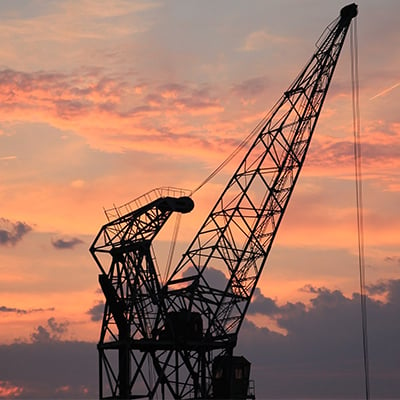

The maritime industry, uses cranes both large and small to efficiently move cargo and supplies. Maritime work is inherently dangerous, but when you add cranes and heavy machinery your changes of injury greatly increase. Many factors cause crane accidents but there are some that are more common than others. Operator error, worker error, mechanical failure, lack of safety equipment and training, and fatigue are just a few of the most common causes of maritime crane accidents.
1. Operator error and maritime crane accidents
One of the the most common causes of maritime crane accidents is operator error. Crane operators take on a huge responsibility and should have a great deal of knowledge about the machinery they operate. It is important that they how cranes operate and how to maintain their machine. Unfortunately, not all do.
In a report issued by the National Institute for Occupational Safety and Health one crane accident occurs every 10,000 hours of crane use in the U.S.. Operator error causes nearly 80% of these accidents. Dropped loads, failure to communicate appropriately with workers on the ground, and failure to drive the crane at a safe speed are all common operator errors that have led to disaster and sometimes death. Operators have a duty to ensure their crane is properly maintained, not overloaded, and that cargo is properly balanced. Catastrophic injuries can and have occurred from failure to do so.
VB Attorneys recently handled a crane accident case against B&G Crane in which a 1,000+ pound water pipe fell on a rigger, crushing him to death. Operator error and improper safety and training by the company resulted in a jury verdict of $44 million for the victims family. Read more about this case.
2. Worker error
The maritime industry is one of the most dangerous industries in which to work. One wrong move could end in disaster. During loading and unloading, crane operators rely on on ground workers to secure items to the load being lifted. Human error or improper training often leads to improperly secured loads. Injuries, and drownings have happened after maritime workers were hit with falling loads during crane accidents causing them to fall into the water.
Seamen are also at risk for trips and falls due to crowded maritime vessel environments made even more dangerous while heavy machinery is operating. Keeping vessels clean and clutter free helps to reduce the chance of injuries. Effective communication between the crane operator and the ground workers is extremely important. This helps to make sure everyone is aware of where they should be and what they should be doing.
VB Attorneys, along with other plaintiff’s attorneys, brought a lawsuit against a Houston refinery by eight workers injured in a crane collapse in which four workers lost their lives. Learn more about how we settled this case.
3. Mechanical failure and crane accidents
Disastrous crane accidents have occurred as a result of improper equipment maintenance or incomplete repairs. A machine is dangerous to everyone around it if any of its parts are not functioning correctly. Especially when used daily, crane equipment that moves heavy and bulky objects is prone to mechanical problems. After time, the stress of bearing huge loads wear down a crane’s components and lead to reduction in structural integrity. Without maintaining this equipment its not a matter of if crane accidents occur, its when.
Promptly repairing machinery when mechanical issues happen is an important practice. Crane components should be properly oiled and inspected on a regular basis to ensure they are safe. Failure to do so can results in serious accidents that can injure operators , damage equipment and other structures or even kill workers surrounding the equipment. It is an employer’s duty to complete appropriate repairs and maintenance.
Our client, Frank received a life-changing injury while in a basket suspended by unknowingly defective crane cables. Even with severe back injuries, his employer, Hercules Offshore fired him. Hear Frank describe how Brian Beckcom helped restart his life.
4. Lack of safety equipment and training
Improperly trained workers and insufficient safety equipment often cause crane accidents. Seaworthiness under the Jones Act, means that a vessel must be able to carry out its intended mission. This means having appropriate personnel directing it that are capable and knowledgeable. On the job error training, instructions on emergency procedures, and proper use of safety protection equipment are all important in minimizing injuries at sea.
It is an employer’s responsibility to ensure the workers understand the proper way to secure loads or the proper equipment to use for each job. Failure to do so can and has lead to crane accidents involving dropped loads, serious injuries and death. Proper training on the correct way to set up and operate a crane as well as the appropriate equipment to use can seriously reduce the above issues and provide a safer environment for maritime workers.
If you have been hurt in a crane accident due to lack of safety equipment we can help you better understand your options. Get your FREE guide to winning your case and learn more about maritime and offshore injuries.
5. Fatigue, sleep safety and crane accidents
Another cause of crane accidents is worker fatigue. Sleep on a maritime vessel is never guaranteed. Often workers result to caffeine, supplements and other methods to stay awake during their shift. This is a dangerous combination for those operating cranes and other heavy machinery. Fatigued workers are at a much higher risk of making a decision that could injure or kill themselves or others.
An employer has a duty to provide a safe working environment for all seamen. This includes making sure your crew is well rested and is able to fully and safely complete their assigned tasks. Ensuring that scheduled shifts allow enough time to get restful and restorative sleep is important. Additionally, screening employees for sleep disorders and providing adequate sleeping quarters and mattresses greatly decreases the risk of crane accidents.
Read more about sleep debt and why fatigue is fatal in the maritime industry.
If you or a loved one has been involved in a crane accident, time is not on your side.
We understand that crane accidents can be life altering experiences that can have lasting effects. If you or a loved one has been injured or killed in a crane accident it is important that you contact a qualified offshore injury lawyer quickly as you may be eligible for damages including compensation for lost wages, medical treatment, emotional trauma, and more.
By filling our our free and confidential contact form we can speak with you about your case and help you determine the correct course of action to help you get through this trying time.
Topics: Jones Act

